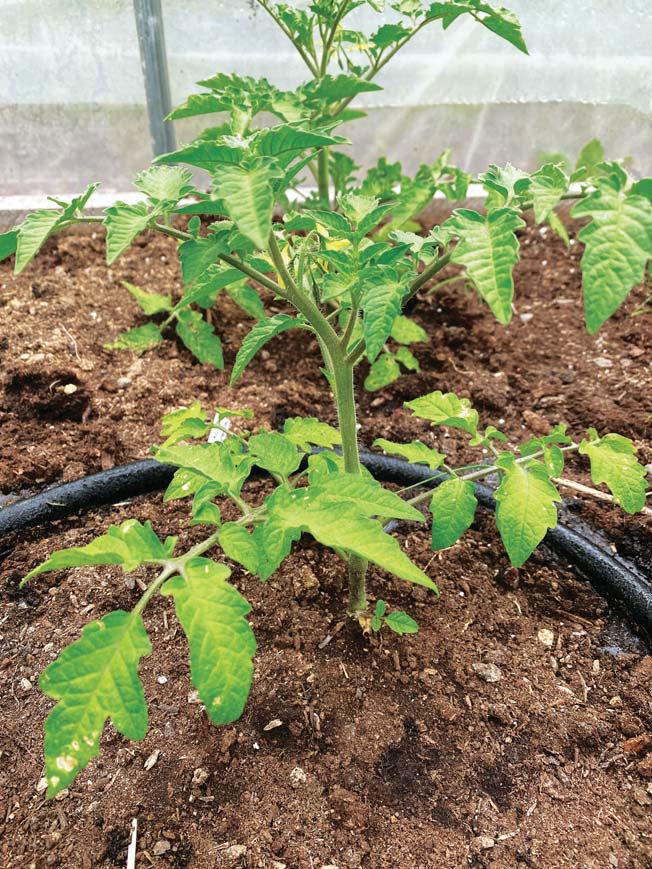
The climate-change emergency has been at the top of my mind throughout the 2023 growing season. This year I’ve been evacuated due to wildfires. I’ve dealt with fl ash flooding and record-breaking rainfalls, and I’ve tried to overcome months of soaring temperatures and high humidity. It was a challenging year in the vegetable garden, but thanks to a handful of climate-change tactics I put in place, the garden still thrived.
Climate-change gardening is all about learning to adapt and create a space resilient to weather extremes. It’s about building and nurturing soil, as well as supporting pollinators, beneficial insects and other wildlife. It also conserves resources like water and encourages the reduction of plastic waste. I can share six strategies to help your garden adapt to our changing climate:
1 FEED THE SOIL My top priority is to feed and nurture the soil in my garden. Understanding what to add to the soil, whether amendments or fertilizers, begins with a soil test. I test my soil every two years by sending a sample to my local agricultural office. (At-home test kits can be bought at garden supply stores, but a lab test is far more accurate.) Testing indicates nutrient availability in the soil and its pH and level of organic matter.
To promote healthy garden soil, I top my raised beds with two inches of organic matter, such as compost or rotted manure, each spring. If a soil test indicates a nutrient deficiency, I’ll also add a slow-release organic vegetable fertilizer. And because my native soils tend to be acidic, I lime my garden annually to raise the pH closer to neutral.
Esta historia es de la edición November - December 2023 de Horticulture.
Comience su prueba gratuita de Magzter GOLD de 7 días para acceder a miles de historias premium seleccionadas y a más de 9,000 revistas y periódicos.
Ya eres suscriptor ? Conectar
Esta historia es de la edición November - December 2023 de Horticulture.
Comience su prueba gratuita de Magzter GOLD de 7 días para acceder a miles de historias premium seleccionadas y a más de 9,000 revistas y periódicos.
Ya eres suscriptor? Conectar

GAGA FOR GALANTHUS
As easy as they are irresistible, snowdrops boast a devoted and growing following

NEW PLANTS
Multiseason Marvels

BLUEBERRIES & CO.
Members of the genus Vaccinium provide sweet flavor, health benefits and beauty in the garden

AN ECOLOGICAL AGREEMENT
How three great minds think alike

Take It Indoors
Cs the growing season dwindles, _ potted cittus became a summer souuenir

ROOTED IN PLACE
LAYERING IS A PROPAGATION TECHNIQUE THAT TAKES A WHILE TO COMPLETE, BUT IT DEMANDS LITTLE EFFORT FROM THE GARDENER

AT HOME WITH PLANTS
Business travel and pleasure trips helped inspire this Cincinnati garden

THE GARDEN GOES DARK
Yes, gardens have their dark side. But-surprise! A garden's darkness can be good, not sinister.

LOW-WATER WONDERS
EXPLORE ONE PLANTSMAN'S DROUGHT-TOLERANT FAVORITES FOR EACH LEVEL OF THE GARDEN

Succeed With Succession- The best crops to plant throughout summer, plus how to time them right
The best crops to plant throughout summer, plus how to time them right. Once a crop like spring turnips or snap peas has finished, I tidy up the bed, amend the soil with a thin layer of compost and replant. Depending on the new crop, I may be sowing seeds or transplanting seedlings.